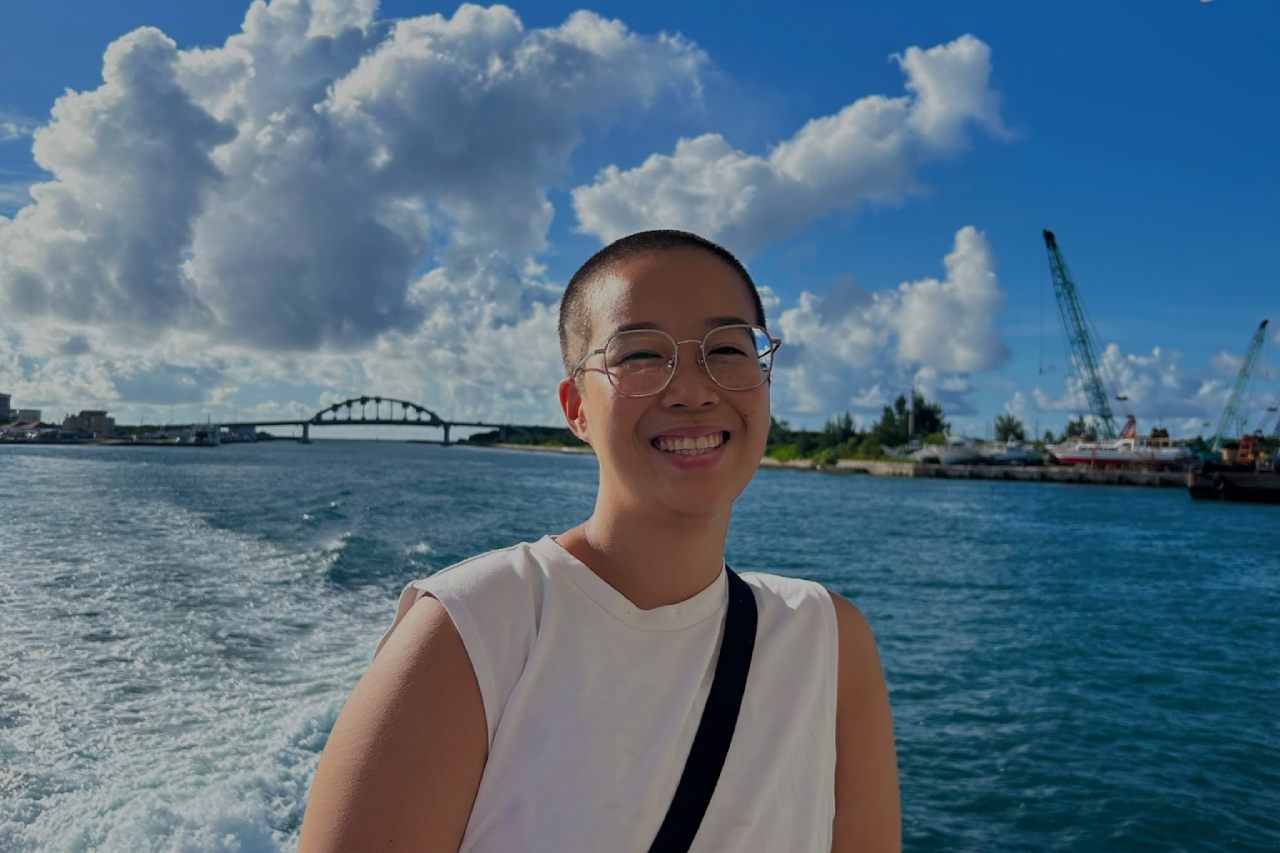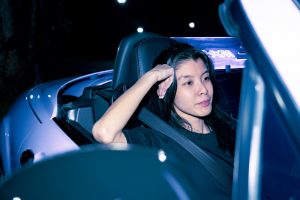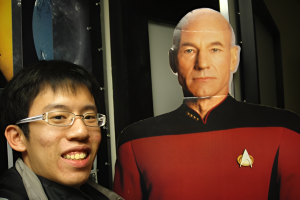In ‘Singaporeans Abroad’, we share the stories of locals who—thanks to living in a globalised world—have found success in different corners of the globe, whether financially, romantically, or for the pure joy of adventure.
We recently heard from Eleazar Ng, who left the RSAF to become a pro baseball player in Japan. Then, there was Malika Avani, who hitchhiked across Europe and Latin America and learned shamanic healing techniques.
Now, we bring you Joleen Teo, who’s contemplating a long-term move to Okinawa to chase her dreams of never leaving school.
I’ll be hitting close to 30 before I can finally say I have a job.
Such is the life of an academic. Even after I finish my master’s, it will take me a few more years to get a PhD and land a full-fledged job.
But there are perks! Most of the time, academic life is very international—we go where our research interests take us. I’ve had short stints in Chile, Portugal, and the Netherlands. And at the start of this year, I moved to rural Okinawa to research atom systems (more on that later).
It’s a pretty good deal. You get a small stipend that’s enough to live off, and free boarding on campus. And I can look out the window, see that the weather is nice, drop all my work and go snorkelling—that’s probably the craziest thing to me.
Life could have looked different. I was offered a Public Service Commission (PSC) Scholarship in 2019, which I turned down. If I’d taken it, I’d likely have better financial stability like most of my peers now.
But it would have also meant remaining in Singapore, serving out a six-year bond, and closing the door to the many of the international stints that have made me the academic I am today.
Looking back, I can say I don’t regret it. My peers may have financial freedom. But I have the freedom to do what I want.
Forces of Attraction
I was always interested in science from a young age. My family is involved in the food industry and film. It’s very artsy stuff—the opposite of science—so I think they didn’t know what I was talking about when I was nine.
I went to St Joseph’s Institution International, where I always did pretty well—in the STEM subjects, especially. Maybe that’s why it sounds nice to me to be able to do ‘more school’ and essentially avoid a ‘big girl job’.
But I think a misconception I had as a teenager was that being good at something meant that I liked it. In secondary school, my favourite science was chemistry because I was better at it. It was only in my undergrad years that I realised that I actually enjoyed physics more.
Physics is much harder work, for sure—it doesn’t come to me as easily as chemistry. And it’s very mathematically rigorous. But I really love that physics can answer big questions about the universe.
How did the universe come to be? How might it evolve in the future? We try to uncover the underlying laws behind the universe that could give us the answers.
We try to discern patterns in the world around us that might not be obvious to the naked eye, and use this to predict particles or forces that we have not even been able to observe yet! That’s the best thing about physics in my opinion—it’s the exact same laws that govern the smallest things, from tiny atoms, to the largest things, like black holes.
When I decided I wanted to go into academia—I wanted to get a PhD in quantum physics and become a college professor eventually—my family didn’t really know what I was doing. But they were like, “You go!”
If I were to describe my work to a layperson: I work in quantum physics. Fundamentally, what I try to do in my job is to model ultra-cold atom systems.
When we bring atoms to very, very cold temperatures, they exhibit very interesting quantum behaviours, such as behaving like waves, and that gives us quite a few interesting properties to study, like interference. In fact, in some very special cases, you can even form a giant matter wave.
What I do, basically, is simulate these systems numerically because it’s very difficult to achieve these very, very cold temperatures within a lab setting. Through this, we learn more about what goes on in atoms, the basic building blocks of matter.
It’s not something that’s easy for my family (or anyone else!) to wrap their heads around. But being academically stable throughout my whole childhood—and my whole life—also gives them a bit of confidence that I’m making the right choice for myself. They weren’t too worried about it.
In a way, it’s quite a privilege to have that kind of academic stability. I know that’s one definition of success, but unfortunately, in Singapore, it’s the dominant definition of success.
I also know what a privilege it is to be offered a PSC scholarship—the premier government scholarship—and to turn it down.
At the end of the day, I just didn’t really like the idea of being bonded to the government for six years. And I had to make the decision at 18, which seemed a bit crazy to me—you’re essentially deciding exactly what the next decade of your life is going to be. At 18!
Right now, I’m in Oxford University doing my master’s degree in mathematical and theoretical physics. But after this, I really want to return to Okinawa to pursue my PhD. Physics, academia, Okinawa—these are all things I couldn’t have decided on at 18.
A Quantum Leap Into Rural Life
Life in Okinawa couldn’t be more different than Singapore. You’re living on an ulu campus in Onna, a seaside village, and there are about 10 shuttle buses a day. That’s your only way of getting around.
That, or a car, but I can’t drive yet. There isn’t much of a public transport network here, so you really have to be strategic about planning when you go out to get groceries.
Some have asked me: Why Okinawa in particular? Being a tropical island, it was an easy choice. I’ve always loved the sea, and I even had a short stint as a professional scuba diver (I do do things besides math and science).
The move at the start of this year to take on a research assistant role at Okinawa Institute of Science and Technology was a trial run of sorts. Could I see myself staying long-term to do my PhD? Was rural life even going to be my thing?
As it turns out, I loved my daily life there.
I went in with the expectation of mainland Japanese work culture—you know, crazy work hours, crazy pressure. After you work, you have to go drinking with your bosses, and then you pass out on the street.
But it’s really the complete opposite in Okinawa. Of course, OIST is very international, so the local Okinawan might have a different life experience.
The funniest thing I noticed when I first entered the office was the snorkelling masks and fins on everyone’s desks. If the weather looks nice, they don’t even need to go home—they’re out of there!
Another thing that blew my mind was how close you are to nature here. If you’re from mainland Japan, you would think of Okinawa as a remote island. But you live in Okinawa; you think of yourself as the mainland because there are a bunch of remote islands around you.
On one weekend trip to Keramashoto National Park, I saw the Milky Way for the first time. Especially as someone with an astrophysics background, it’s quite crazy to admit that I hadn’t seen the Milky Way before.
It was magical being so close to nature and being able to do that so casually. And it wasn’t a big trip. You know how people make big trips to Iceland to see the Northern lights? It was mind-blowing to me that I could spontaneously decide to go camping, see the stars at night, and then go diving the next day.
One thing, however, that took a lot of getting used to was learning how to spend my free time having fun. It sounds so pathetic, I know.
In Singapore, because of the super-fast pace, you typically have around 20 minutes of breathing time between tasks. It’s not long or meaningful enough to do a hobby.
In Okinawa, with the slower pace of things here, I would find myself with two-hour blocks of time. At the start, I ended up being on my phone a lot; I didn’t know what you’re supposed to do with free time!
It actually took a while for me to figure out some activities that work for me: Cooking, going to the farmers market, and going on hikes. It’s nice to slowly fill my schedule with these fun activities, even though they don’t come to mind initially.
There’s also nothing to do at night, so I’d end up cooking and spending time with other research assistants, playing games like Dungeons & Dragons. We ended up laughing about it a couple of weeks ago—we were basically living the lives of The Big Bang Theory.
A State of Flux
In university, the scientists are the nerdier ones. So, truthfully, I was very excited to take my first steps into an academic career—the nerdiest setting I could imagine.
Everyone’s a scientist. Everyone’s a researcher.
OIST is also a non-traditional university. They don’t have undergrads, which also means they also don’t have departments. I’m not attached to the Department of Physics, for example, nor am I under the Department of Chemistry—there are no lines between people. Everyone just shows up and does research.
There are so many exciting collaborations between units that you might not see in traditional universities. I do theory, which means I do lots of coding and programming. Even though I’m not based in the labs, I still have very good friends on the experimental side who spend their days working with lasers, actually cooling real atoms down to very low temperatures.
And it’s just incredibly fun to me to be able to interact with people from different research backgrounds, and catch up over lunch on the things we’re working on.
Academia—learning, researching, teaching—is great. I can’t ever imagine myself doing anything else.
It is, however, a long path. As someone with just one degree right now, I am still one of the most junior people in the room. It’s quite humbling.
I know that the usual path Singaporeans take is to get a university degree, find a good job, and get started in life. Being able to say no to a ‘real’ job that might add some financial stability to my life and my family’s life… I don’t think that many people can make that choice.
In that sense, I feel privileged to do that with a family that supports my choices.
I’m on my own path, but I’d be lying if I said I feel zero anxiety when I think of the fact that my peers are earning more and accumulating savings. A couple of years ago, I would have said that money doesn’t matter. That money doesn’t affect my happiness.
And I still don’t think it affects my happiness that much. But stability really affects happiness.
As I’ve moved on in life, whether in my undergrad career or now in Oxford, I’ve encountered a lot of scholars. I can’t lie; I’m a bit envious of their stability as students. They’re not worrying so much about finances. They’re a little more free to spend. They don’t have to have a side hustle like me—I work on the side, teaching Physics, Mathematics and Chemistry tuition. The end goal is to work as a professor, though, so I guess I’m also honing some of those teaching skills.
In the end, I do think giving up the scholarship was the right decision for me. I’m happy to be putting in the work that I’m doing and living a bit more frugally if I’m able to do what I want after I graduate.
The freedom to make my own choices—I think it’s worth the struggle.





